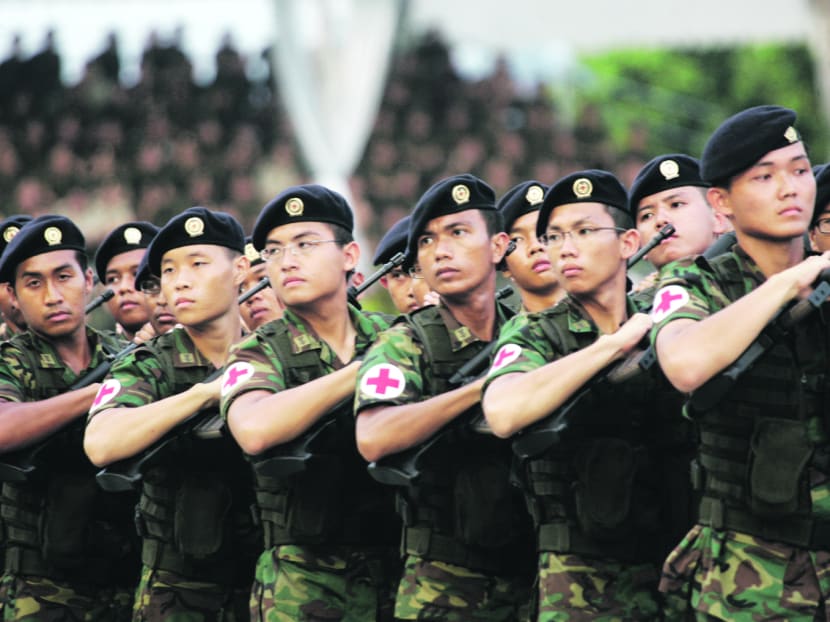Employers suggest ways to strengthen National Service
SINGAPORE — A portal for bosses to find out what their employees do during In-Camp Training (ICT), or what skills they acquire so that these can be utilised at the workplace. Monetary incentives — in the form of tax breaks or subsidies to hire temporary replacements — to compensate firms whenever their staff are called up for national duty. Restructure ICT such that national servicemen (NSmen) will be away from their jobs for shorter periods, albeit more frequently.
SINGAPORE — A portal for bosses to find out what their employees do during In-Camp Training (ICT), or what skills they acquire so that these can be utilised at the workplace. Monetary incentives — in the form of tax breaks or subsidies to hire temporary replacements — to compensate firms whenever their staff are called up for national duty. Restructure ICT such that national servicemen (NSmen) will be away from their jobs for shorter periods, albeit more frequently.
These were some suggestions brought up yesterday by 33 employers — mostly members of the Singapore Business Federation, Singapore National Employers Federation, or the Association of Small and Medium Enterprises — at a focus group discussion organised by the Committee to Strengthen National Service (CSNS). The session, which lasted more than three hours, was also attended by Second Minister for Defence Chan Chun Sing and Chief of Defence Force Ng Chee Meng.
Other issues that the participants raised included the need to constantly stay in touch with their employees, even during outfield training.
They also voiced concerns that, compared to foreigners and women, NSmen could be disadvantaged in terms of career advancement due to their NS commitments.
Urging employers to be more aware of ensuring NSmen do not lose out in the workplace, one participant conceded that he had “subconsciously” assigned major projects to foreigners or women because he saw them “more often” at work compared to his male Singaporean employees.
To address this, employers should consider NSmen’s contributions and achievements during ICT in appraisals and promotions, the participants suggested.
Since May, the CSNS has been holding focus group discussions to gather ideas from the public.
At yesterday’s session, many participants expressed a need for direct communication between employers and the Ministry of Defence (MINDEF) on matters relating to their employees’ NS commitments.
Mr Nicholas Chan, 35, Managing Director of Fredrik Marine IT Services, said an online portal — where bosses can also find out their employees’ ICT dates and other information — would enable “two-way” communication.
It would also allow the “meshing” of a serviceman’s civilian and military skills — benefiting both employers and the military commanders, said EnergyCorp Global CEO Michael Heng, 58.
“Ours is a citizen army and the strength of our army lies in the strength of our citizens,” said Mr Heng, who also urged MINDEF to deploy NSmen in a way that maximises their skills in the civilian world.
To help NSmen clear their work emails even when they are outfield, Mr Chan suggested using generators to charge mobile phones, which can be used to set up Internet hot spots.
While the participants wanted monetary incentives for companies to “recognise (their) sacrifices”, they were divided on whether it should be tax breaks that are proportionate to the number of NSmen a company hires or subsidies for hiring temporary replacements, for example.
Wrapping up the session, Mr Chan Chun Sing cautioned against “monetising” National Service, although he acknowledged that incentives and rewards “almost always have a monetary perspective to it”.
“How do we find the balance between not monetising NS and yet at the same time recognising it? Nothing we did can ever reward NSmen, but they are many things we can do that can recognise NSmen,” he added.
On the suggestion for shorter but more frequent ICT, he pointed out that NSmen need time to build up their fitness for the training.
“We are also concerned about the safety of NSmen,” he said.
Nevertheless, he agreed that communication between military commanders and employers can be improved. “Very often, the employers may not understand what the NSman is going through,” he noted.








